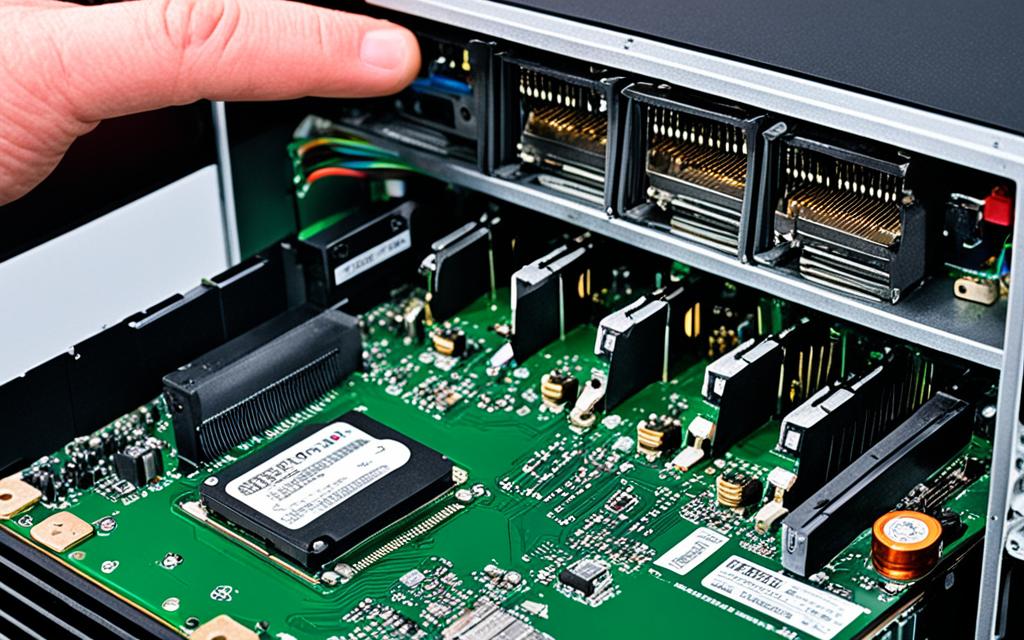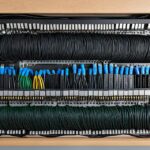Table of Contents
In our digital age, storing videos is crucial. Digital Video Recorders, or DVRs, play a big role in this. They use a special part called an internal hard drive to keep footage safe. This part is very important because it holds all the recorded content. Most DVRs use SATA hard drives. SATA stands for Serial Advanced Technology Attachment. It’s a type of connection that moves data fast and is important for DVRs to work well. Unlike normal computers, DVRs have to work all the time. This means they need very reliable hard drives to not lose any video. In this article, we’ll look into how hard drives in DVRs work. We’ll see why it’s important to choose good ones for the best performance. Good hard drives help make sure we don’t lose our videos1
Key Takeaways
- DVRs rely on internal hard drives for storing recorded video content.
- Utilising SATA hard drives ensures efficient data transfer within DVR systems.
- Continuous operation of DVRs necessitates the selection of high-quality hard drives.
- Understanding DVR technology enhances video storage solutions.
- Reliable storage is fundamental for effectively managing recorded footage.
Understanding DVR Technology
Times have changed from the days of VCRs to today’s DVRs, improving how we interact with media. This evolution of DVRs means we now enjoy more efficient operations and better viewing experiences. Moving from tapes in VCRs to digital with DVRs lets users easily record and access videos.
The Evolution from VCRs to DVRs
VCRs depended on tapes, limiting their quality and usability. DVRs, however, use sophisticated digital storage. This leap forward lets us record in real-time and connect to our home networks. With DVRs, users can record different shows at the same time on several channels, thanks to dual tuners. This boosts convenience significantly2.
How DVRs Function
DVRs work by capturing and storing live TV after encoding it, usually in MPEG-2 format. Users can then play back their recordings anytime, adjusting quality and length as needed. Unlike VCRs, modern DVRs can record new shows while playing back others. They manage multiple streams at once, making our viewing smoother.
Adding extra storage to DVRs has become easier, offering more flexibility. However, this might affect warranties2. As DVR technology advances, including high-capacity drives is key. They meet the growing storage needs of security and entertainment fields34.
Does DVR Have Hard Drive?
It’s vital to understand how important hard drives are in Digital Video Recorders (DVRs). They store your precious video data. A good hard drive ensures your DVR works well and keeps your footage safe for a long time.
The Role of Hard Drives in DVR Operation
Hard drives are key for storing videos in DVRs. They need to handle lots of data without failing. It’s important to pick a hard drive that fits your needs now and in the future. Ensuring continuous access to your videos is essential.
Types of Hard Drives Used in DVRs
DVRs mainly use SATA hard drives for their high performance. AV-grade drives are best for handling continuous video streaming. Unlike normal computer hard drives, AV-grade drives can work non-stop without losing data. Seagate’s SkyHawk series is a great example of these high-quality drives. They offer features that keep surveillance footage secure.
| Type of Hard Drive | Features | Suitable For |
|---|---|---|
| SATA Hard Drives | High efficiency, reliable | All DVRs |
| AV-Grade Drives | Optimised for continuous recording | Surveillance systems |
| Standard Drives | Lower durability under high loads | General computing |
With growing video surveillance needs, choosing the right hard drive is key to success. For information on cloud storage options, check this resource5.
Importance of Using AV Grade Hard Drives
The choice of hard drives is crucial for reliability in DVRs and its performance. Standard drives might look fine for normal use, but can let you down. They lead to increased risks and DVR efficiency problems. Knowing why these drives might not work well is important for those who use DVR technology a lot.
Why Standard Drives May Fail
Standard drives aren’t made for the non-stop work DVRs need. They can fail when recording all the time. This could mean losing data and getting worse recording quality. Hard drive failure is more common for these than for surveillance drives. This raises worries about relying on them for a long time.
Benefits of AV Grade Drives for Continuous Use
AV-grade drives are made for recording. They have a high MTBF, about 1 million hours, which means less downtime. They let you record important stuff constantly. These drives can handle a huge amount of data and record from up to 64 HD cameras. They make sure the DVRs stay reliable6.
Optimal Recording Performance
Using AV-grade drives really improves recording performance. Thanks to better technology, they store more data and transfer it fast. This means smoother footage. They’re designed to be great at storing and performing, making DVR systems work better.
| Feature | Standard Drives | AV-grade Drives |
|---|---|---|
| Mean Time Between Failures (MTBF) | Lower than 1 million hours | Around 1 million hours |
| Supported Workload | Limited | Up to 180TB/year |
| Simultaneous HD Streams | Usually fewer than 16 | Up to 64 |
| Recording Reliability | Prone to failure | High reliability |
Discover more about NAS and surveillance drives here7.
Switching to AV-grade drives boosts DVR system efficiency and durability. It makes recordings high-quality and storage reliable67.
Factors Influencing Hard Drive Storage Capacity
Several things determine how much a DVR’s hard drive can hold. Things like recording quality, the number of cameras, and frame rates play big parts. Each aspect helps decide how much data you can store without losing performance.
Impact of Recording Quality on Storage
Recording quality greatly affects how much storage DVRs need. High-definition videos use a lot more space than standard ones. For example, high resolution and fast frame rates boost the need for storage8. HD 1080P videos in particular push hard drive limits. This shows why having enough storage for high-quality videos is key.
Calculating Storage Based on Camera Count
Adding more cameras to a DVR system increases its storage needs. Every new camera adds more data to store. It’s important to know how adding cameras affects storage space. Surveillance hard drives are made to run all the time, staying cool9. This is vital for security, where any downtime means risks.
Frame Rates and Their Effect on Recording Time
Frame rates also play a key role in DVR storage and recording time. Lowering the frame rate lets you record for longer without needing more storage. For instance, dropping from 6 fps to 3 fps doubles your recording time on the same hard drive. This lets you manage storage well, while still capturing needed video without losing data10.
| Factor | Impact on Storage Capacity | Notes |
|---|---|---|
| Recording Quality | Directly proportional to data volume | HD requires significantly more space than SD |
| Camera Count | Increases data generation | Each camera adds to overall storage needs |
| Frame Rates | Influences recording time | Lower rates allow longer recordings without more storage |
In conclusion, recording quality, the number of cameras, and frame rate adjustments all impact DVR storage needs. Users must think about these factors to make sure their setup works well and uses storage efficiently9108.
Conclusion
Understanding the importance of hard drives in DVR technology is crucial for those looking for effective video management. Choosing AV-grade hard drives and considering the recording quality, number of cameras, and frame rates can greatly improve DVR storage. This is vital for anyone wanting to optimise their systems11.
Modern DVRs enhance surveillance by supporting many camera inputs and detecting motion. This makes managing large video data easier and more efficient. It sharpens the overall surveillance effort12.
The world of video recording and storage tech keeps evolving. Being informed about the best storage and management practices is key. Users should visit DVR storage summary for insights. This helps in protecting precious video memories and ensuring systems work at their best13.
FAQ
Do all DVRs contain hard drives?
Yes, every Digital Video Recorder (DVR) has an internal hard drive. It’s the main place where video is stored. These drives handle recording and managing the footage. So, you can watch your videos any time you want.
What distinguishes AV-grade hard drives from standard drives?
AV-grade hard drives are built for the heavy duty work of recording and playing video around the clock. Standard drives might not last under such heavy use. AV-grade drives are more reliable and have a lower chance of failing, which makes them perfect for DVRs.
How does recording quality affect storage capacity in DVRs?
The quality of recording affects how much space you need. High-definition videos, like HD 1080P, use more space than low quality ones. You must pick a hard drive size that matches your recording quality to have enough room for your videos.
Why is it crucial to select the right hard drive for a DVR?
Choosing the correct hard drive is key to a DVR’s reliability and performance. Top-notch drives help prevent data loss. They also support effective video data handling and guarantee that DVR systems capture footage reliably.
What role do frame rates play in storing video on a DVR?
Frame rates have a big influence on how long you can record. Using lower frame rates means you can record for longer without needing more space. Making smart adjustments to these rates can make your DVR work better and save storage.
What factors should I consider when calculating storage needs for my DVR?
To figure out your storage needs, think about the quality of the video, how many cameras you have, and the frame rates you’re using. How much data you create with these settings decides how much space you’ll need on your DVR’s hard drive.
Source Links
- https://www.cctvcamerapros.com/CCTV-DVR-Hard-Drive-Troubleshooting-s/1063.htm – How-to Determine if your CCTV DVR Hard Drive Hard Failed
- https://electronics.howstuffworks.com/dvr.htm – How DVR Works
- https://www.a1securitycameras.com/blog/what-is-the-purpose-of-dvr-in-cctv/ – What is DVR (Digital Video Recorder) in CCTV?
- https://www.newtechindustries.com/blog/what-is-the-difference-between-a-pc-hard-drive-and-cctv-dvr-hard-drive/ – What is the difference between a PC Hard Drive and CCTV DVR Hard Drive?
- https://www.westerndigital.com/en-in/solutions/cctv/blog/dvr-vs-nvr-video-storage-device-technologies – DVR VS NVR: Video Storage Device Technologies | Western Digital
- https://www.seagate.com/products/video-analytics/skyhawk-hard-drive/ – Seagate SkyHawk Video Hard Drives | Seagate US
- https://www2.advantech.tw/certified-peripherals/Files/PerformanceWhitepaperByHDD.pdf – PDF
- https://sirixmonitoring.com/blog/what-is-dvr-how-does-it-work/ – What is a DVR and how does it work?
- https://solink.com/resources/industry-insights/what-is-a-surveillance-hard-drive/ – What is a surveillance hard drive in 2024?
- https://www.techchef.in/what-factors-affect-the-performance-of-a-hard-drive/ – What factors affect the performance of a hard drive
- https://www.spottersecurity.com/blog/what-is-dvr/ – DVR (Digital Video Recorder): Everything You Need To Know
- https://www.techage.com/blogs/news/requirements-for-surveillance-hard-drive – Requirements for Surveillance Hard Drives: Essential Considerations
- https://www.isarsoft.com/knowledge-hub/dvr – What is a Digital Video Recorder (DVR)? DVR Meaning | Isarsoft








